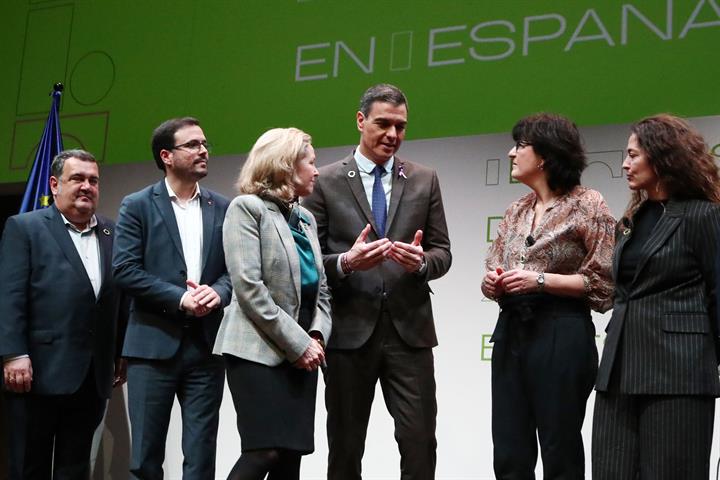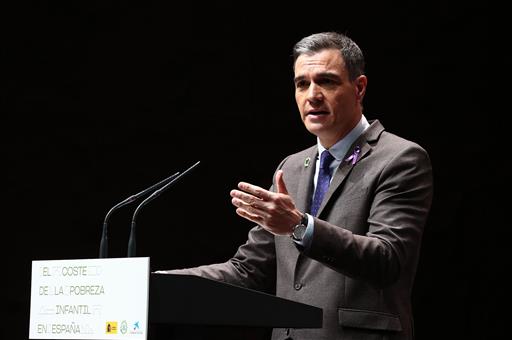Closing event of the presentation of the study 'The cost of child poverty in Spain'
Sánchez underlines that the Government has prevented "almost a million children and adolescents from falling into poverty"
President's News - 2023.3.6
Caixa Forum Auditorium, Madrid
"Not only are we not resigned to the figures, but we are fighting against inequality and child poverty as one of the most powerful driving forces behind the actions of the progressive coalition government...not only for social justice but also in the interests of the country", he added.
The president made this statement at the closing ceremony of the presentation of the study 'The cost of child poverty in Spain', coordinated by the High Commissioner against Child Poverty in collaboration with the La Caixa Foundation, which was also attended by the First Vice-President and Minister for the Economy and Digital Transformation, Nadia Calviño, and the Minister for Consumer Affairs, Alberto Garzón.
At the event, held in the CaixaForum auditorium in Madrid, Sánchez stressed that child poverty costs more than €63 billion a year, 5.1% of annual GDP based on figures for 2019. This cost is calculated on the basis of two magnitudes: first, the fact that in adulthood, these people will earn €5,100 gross less per year; and second, the exponential increase in the risk of poor health and the resulting costs to the health system.
The chief executive stressed that inequality is even greater in the case of girls, who are "victims of double discrimination: because of being women and because of a childhood marked by poverty".
To this effect, he pointed to four main lines of government action to combat child poverty and to dignify wages to combat in-work poverty and to tackle the wage gap. First, the implementation of the Minimum Basic Income, which already protects more than 1.5 million people and half a million households, two thirds of which include at least one child. More than 42% of all beneficiaries are minors and 6 out of 10 beneficiaries are women.
Second, the increase in child benefits, which were frozen for 17 years until 2019. Since that year, the amount has been doubled for children living in severely poor households, and the Complementary Child Allowance of €100 for children up to the age of 3 years has been implemented, now reaching 300,000 households.
Third, the courageous measures in the socio-labour field, such as the increase in the minimum wage and the interprofessional minimum wage by 47% in five years, benefiting over 1.7 million women, and the increase and equalisation of paternity and maternity leave to improve families' work-life balance. And last but not least, progress in "fiscal justice", with a reduction in personal income tax that will benefit half of all workers; the reduction in VAT on gas and electricity; and the promotion of the thermal and electricity social voucher to combat energy poverty.
Sánchez also referred to investment in the field of education, with a historic allocation to scholarship policy of more than €2.5 billion.
Many of these measures are part of the Action Plan to implement Child Guarantee Europe, which is endowed with €1.66 billion, 66% more than planned and double the minimum required by the European Commission.
A pioneering law to extend parity to all areas of life
 Ernesto Gascó, Alberto Garzón, Nadia Calviño and Pedro Sánchez, along with other participants in the event | Foto: Pool Moncloa/Fernando Calvo
Ernesto Gascó, Alberto Garzón, Nadia Calviño and Pedro Sánchez, along with other participants in the event | Foto: Pool Moncloa/Fernando Calvo
On the eve of 8 March, the president pointed out that tomorrow the Council of Ministers will take the first step towards the approval of a "pioneering regulation in Europe. It is a law to extend parity to all areas, and in this we have been pioneer in the realm of political power, to the point of making Spain one of the main world references, and we are going to consolidate this position with this law. And we want to go a step further and extend it to the private sector as well, promoting the presence of women in management positions in large companies, in professional associations and also on Award Boards.
In his opinion, "if women are half of society, they should be half of political power and half of economic power. Some may see this as excessive, but those of us who believe in feminism see it as just and fair".
On this point, he denounced as "intolerable" that women "are under-represented in STEAM studies and occupations", representing barely 25% in university studies in this field and 10% in Vocational Training. "We in the government are not resigned to this situation, because in the midst of the digital transformation, doing nothing is tantamount to sowing the seeds of a new wage gap," she said.
High Commissioner for the Fight against Child Poverty
During the event, the High Commissioner for the Fight against Child Poverty, Ernesto Gasco, pointed out that with the presentation of this study on the cost of child poverty in Spain, "we are highlighting the importance of scientific knowledge for making progress and getting it right in the fight against poverty and inequality".
"We are visibilising more than a decade of political denialism, which relegated child poverty and inequality in childhood to the back burner, even when this structural problem intensified and reached its peak during the economic recession resulting from the 2008 crisis," he remarked.
Non official translation





